Working with Families and Communities in Early Childhood Education Services
VerifiedAdded on 2023/06/18
|10
|2734
|384
AI Summary
This report discusses the theories and approaches for childhood education services, impact of child's development on families and communities, contemporary social policies and their impact on families, children and communities relationships, culture, social behaviour and contexts. It also evaluates the role of early childhood teacher in working with contemporary sociology or Australian families and communities under early childhood education service provider.
Contribute Materials
Your contribution can guide someone’s learning journey. Share your
documents today.
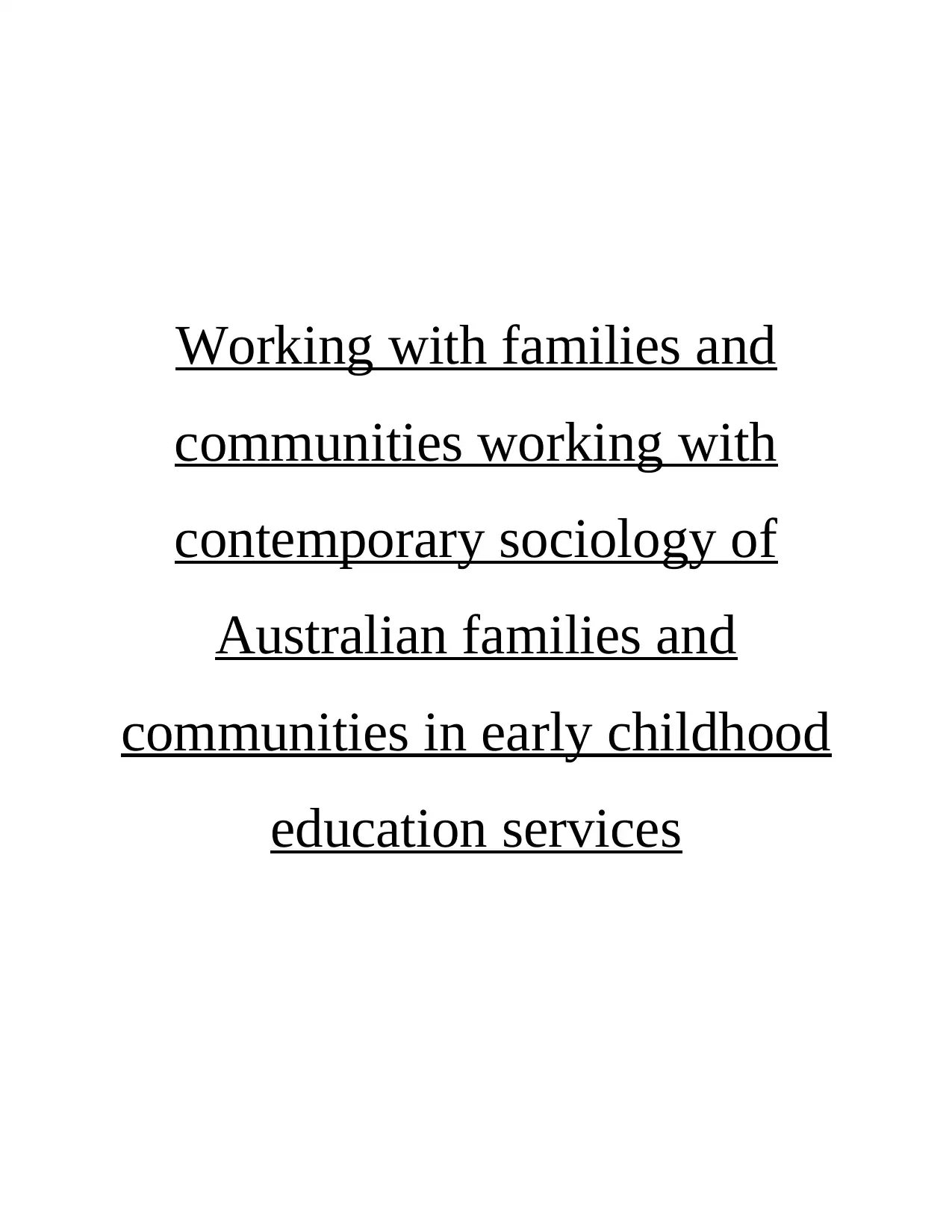
Working with families and
communities working with
contemporary sociology of
Australian families and
communities in early childhood
education services
communities working with
contemporary sociology of
Australian families and
communities in early childhood
education services
Secure Best Marks with AI Grader
Need help grading? Try our AI Grader for instant feedback on your assignments.
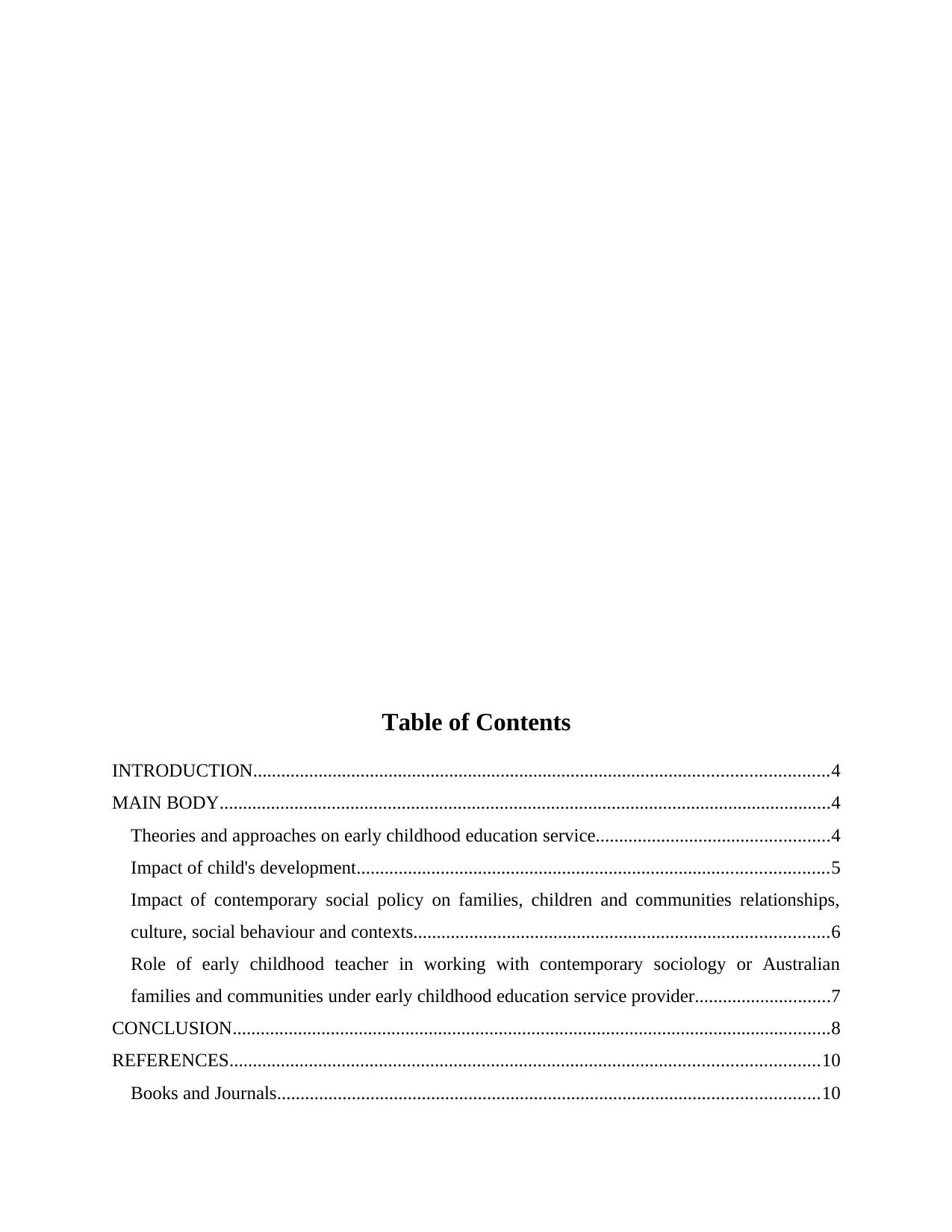
Table of Contents
INTRODUCTION...........................................................................................................................4
MAIN BODY...................................................................................................................................4
Theories and approaches on early childhood education service..................................................4
Impact of child's development.....................................................................................................5
Impact of contemporary social policy on families, children and communities relationships,
culture, social behaviour and contexts.........................................................................................6
Role of early childhood teacher in working with contemporary sociology or Australian
families and communities under early childhood education service provider.............................7
CONCLUSION................................................................................................................................8
REFERENCES..............................................................................................................................10
Books and Journals....................................................................................................................10
INTRODUCTION...........................................................................................................................4
MAIN BODY...................................................................................................................................4
Theories and approaches on early childhood education service..................................................4
Impact of child's development.....................................................................................................5
Impact of contemporary social policy on families, children and communities relationships,
culture, social behaviour and contexts.........................................................................................6
Role of early childhood teacher in working with contemporary sociology or Australian
families and communities under early childhood education service provider.............................7
CONCLUSION................................................................................................................................8
REFERENCES..............................................................................................................................10
Books and Journals....................................................................................................................10

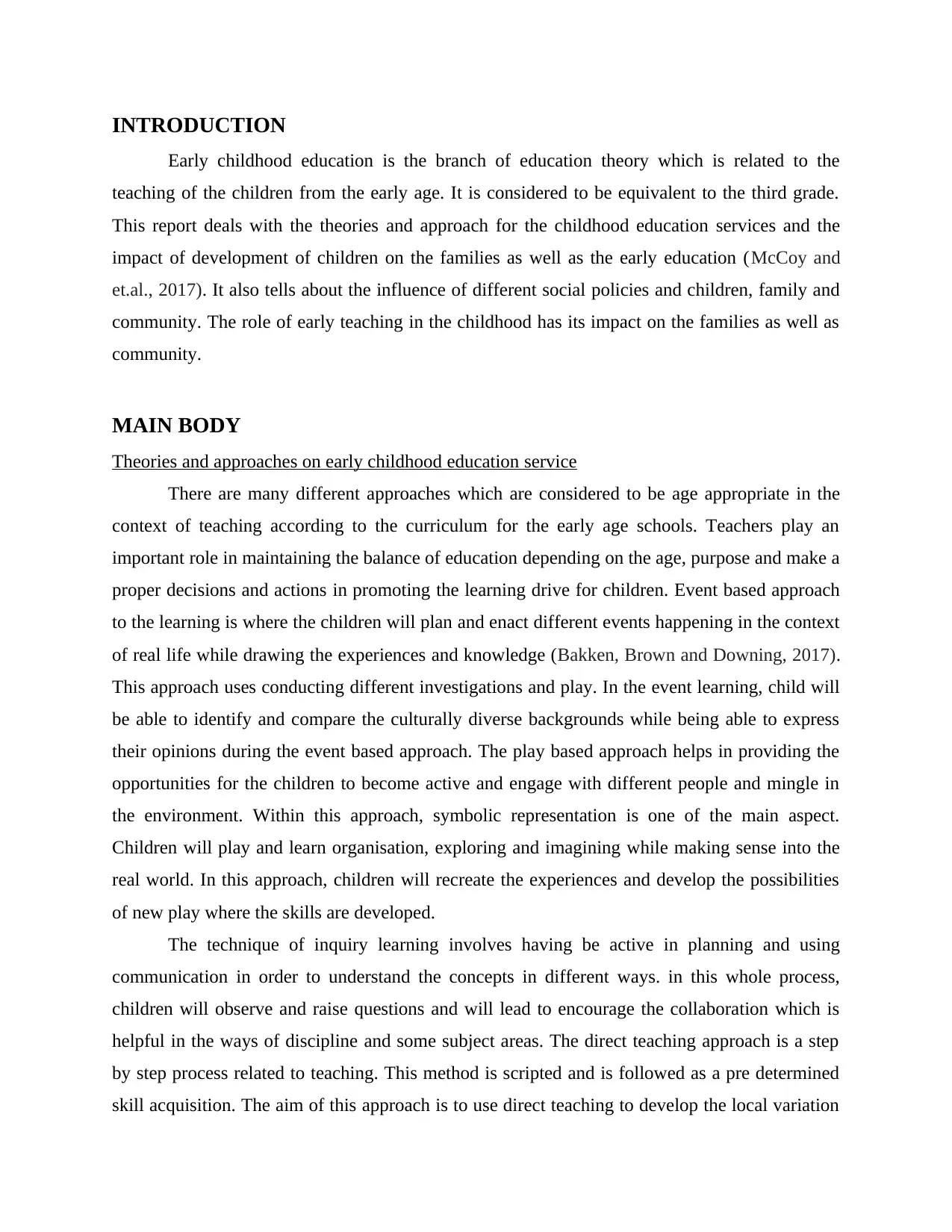
INTRODUCTION
Early childhood education is the branch of education theory which is related to the
teaching of the children from the early age. It is considered to be equivalent to the third grade.
This report deals with the theories and approach for the childhood education services and the
impact of development of children on the families as well as the early education (McCoy and
et.al., 2017). It also tells about the influence of different social policies and children, family and
community. The role of early teaching in the childhood has its impact on the families as well as
community.
MAIN BODY
Theories and approaches on early childhood education service
There are many different approaches which are considered to be age appropriate in the
context of teaching according to the curriculum for the early age schools. Teachers play an
important role in maintaining the balance of education depending on the age, purpose and make a
proper decisions and actions in promoting the learning drive for children. Event based approach
to the learning is where the children will plan and enact different events happening in the context
of real life while drawing the experiences and knowledge (Bakken, Brown and Downing, 2017).
This approach uses conducting different investigations and play. In the event learning, child will
be able to identify and compare the culturally diverse backgrounds while being able to express
their opinions during the event based approach. The play based approach helps in providing the
opportunities for the children to become active and engage with different people and mingle in
the environment. Within this approach, symbolic representation is one of the main aspect.
Children will play and learn organisation, exploring and imagining while making sense into the
real world. In this approach, children will recreate the experiences and develop the possibilities
of new play where the skills are developed.
The technique of inquiry learning involves having be active in planning and using
communication in order to understand the concepts in different ways. in this whole process,
children will observe and raise questions and will lead to encourage the collaboration which is
helpful in the ways of discipline and some subject areas. The direct teaching approach is a step
by step process related to teaching. This method is scripted and is followed as a pre determined
skill acquisition. The aim of this approach is to use direct teaching to develop the local variation
Early childhood education is the branch of education theory which is related to the
teaching of the children from the early age. It is considered to be equivalent to the third grade.
This report deals with the theories and approach for the childhood education services and the
impact of development of children on the families as well as the early education (McCoy and
et.al., 2017). It also tells about the influence of different social policies and children, family and
community. The role of early teaching in the childhood has its impact on the families as well as
community.
MAIN BODY
Theories and approaches on early childhood education service
There are many different approaches which are considered to be age appropriate in the
context of teaching according to the curriculum for the early age schools. Teachers play an
important role in maintaining the balance of education depending on the age, purpose and make a
proper decisions and actions in promoting the learning drive for children. Event based approach
to the learning is where the children will plan and enact different events happening in the context
of real life while drawing the experiences and knowledge (Bakken, Brown and Downing, 2017).
This approach uses conducting different investigations and play. In the event learning, child will
be able to identify and compare the culturally diverse backgrounds while being able to express
their opinions during the event based approach. The play based approach helps in providing the
opportunities for the children to become active and engage with different people and mingle in
the environment. Within this approach, symbolic representation is one of the main aspect.
Children will play and learn organisation, exploring and imagining while making sense into the
real world. In this approach, children will recreate the experiences and develop the possibilities
of new play where the skills are developed.
The technique of inquiry learning involves having be active in planning and using
communication in order to understand the concepts in different ways. in this whole process,
children will observe and raise questions and will lead to encourage the collaboration which is
helpful in the ways of discipline and some subject areas. The direct teaching approach is a step
by step process related to teaching. This method is scripted and is followed as a pre determined
skill acquisition. The aim of this approach is to use direct teaching to develop the local variation
Secure Best Marks with AI Grader
Need help grading? Try our AI Grader for instant feedback on your assignments.
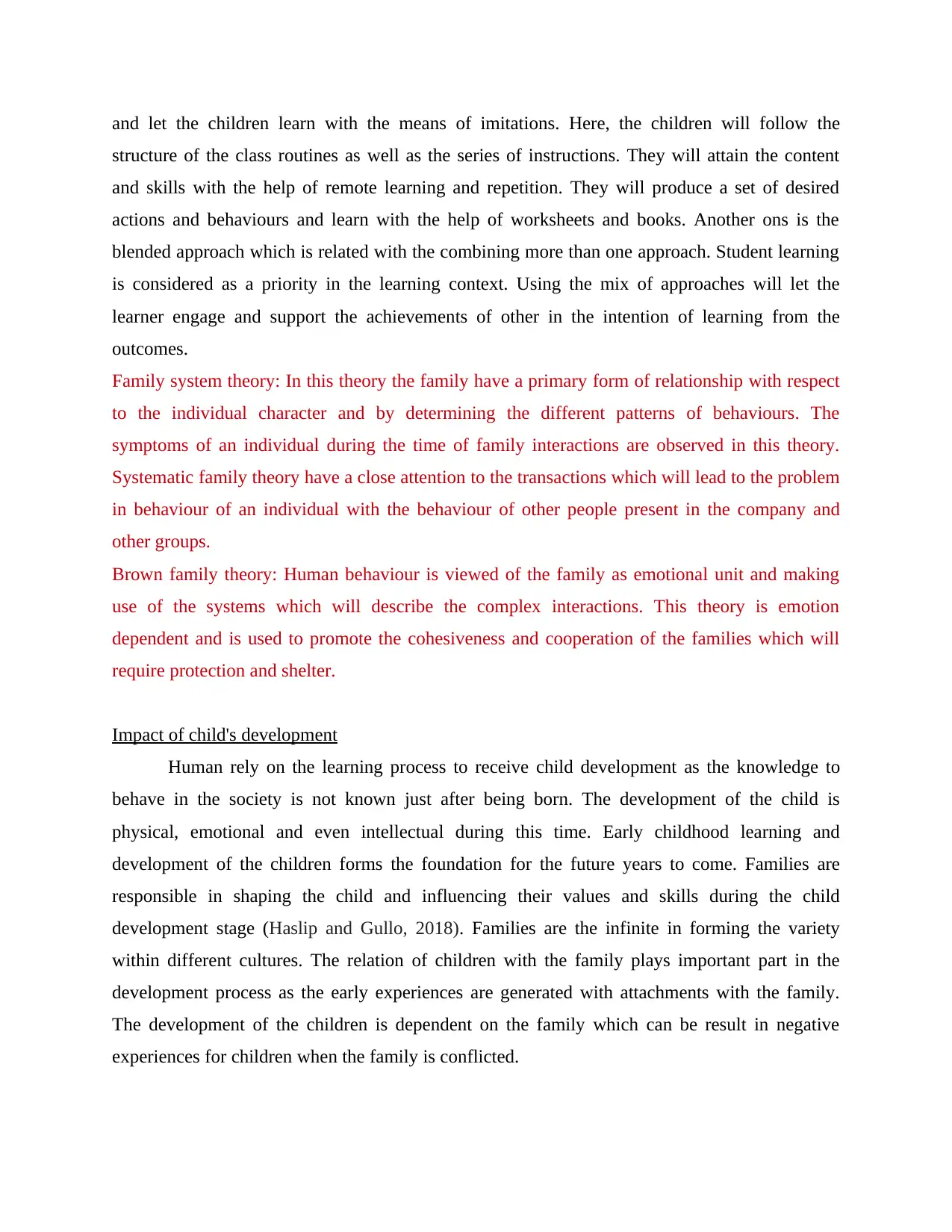
and let the children learn with the means of imitations. Here, the children will follow the
structure of the class routines as well as the series of instructions. They will attain the content
and skills with the help of remote learning and repetition. They will produce a set of desired
actions and behaviours and learn with the help of worksheets and books. Another ons is the
blended approach which is related with the combining more than one approach. Student learning
is considered as a priority in the learning context. Using the mix of approaches will let the
learner engage and support the achievements of other in the intention of learning from the
outcomes.
Family system theory: In this theory the family have a primary form of relationship with respect
to the individual character and by determining the different patterns of behaviours. The
symptoms of an individual during the time of family interactions are observed in this theory.
Systematic family theory have a close attention to the transactions which will lead to the problem
in behaviour of an individual with the behaviour of other people present in the company and
other groups.
Brown family theory: Human behaviour is viewed of the family as emotional unit and making
use of the systems which will describe the complex interactions. This theory is emotion
dependent and is used to promote the cohesiveness and cooperation of the families which will
require protection and shelter.
Impact of child's development
Human rely on the learning process to receive child development as the knowledge to
behave in the society is not known just after being born. The development of the child is
physical, emotional and even intellectual during this time. Early childhood learning and
development of the children forms the foundation for the future years to come. Families are
responsible in shaping the child and influencing their values and skills during the child
development stage (Haslip and Gullo, 2018). Families are the infinite in forming the variety
within different cultures. The relation of children with the family plays important part in the
development process as the early experiences are generated with attachments with the family.
The development of the children is dependent on the family which can be result in negative
experiences for children when the family is conflicted.
structure of the class routines as well as the series of instructions. They will attain the content
and skills with the help of remote learning and repetition. They will produce a set of desired
actions and behaviours and learn with the help of worksheets and books. Another ons is the
blended approach which is related with the combining more than one approach. Student learning
is considered as a priority in the learning context. Using the mix of approaches will let the
learner engage and support the achievements of other in the intention of learning from the
outcomes.
Family system theory: In this theory the family have a primary form of relationship with respect
to the individual character and by determining the different patterns of behaviours. The
symptoms of an individual during the time of family interactions are observed in this theory.
Systematic family theory have a close attention to the transactions which will lead to the problem
in behaviour of an individual with the behaviour of other people present in the company and
other groups.
Brown family theory: Human behaviour is viewed of the family as emotional unit and making
use of the systems which will describe the complex interactions. This theory is emotion
dependent and is used to promote the cohesiveness and cooperation of the families which will
require protection and shelter.
Impact of child's development
Human rely on the learning process to receive child development as the knowledge to
behave in the society is not known just after being born. The development of the child is
physical, emotional and even intellectual during this time. Early childhood learning and
development of the children forms the foundation for the future years to come. Families are
responsible in shaping the child and influencing their values and skills during the child
development stage (Haslip and Gullo, 2018). Families are the infinite in forming the variety
within different cultures. The relation of children with the family plays important part in the
development process as the early experiences are generated with attachments with the family.
The development of the children is dependent on the family which can be result in negative
experiences for children when the family is conflicted.
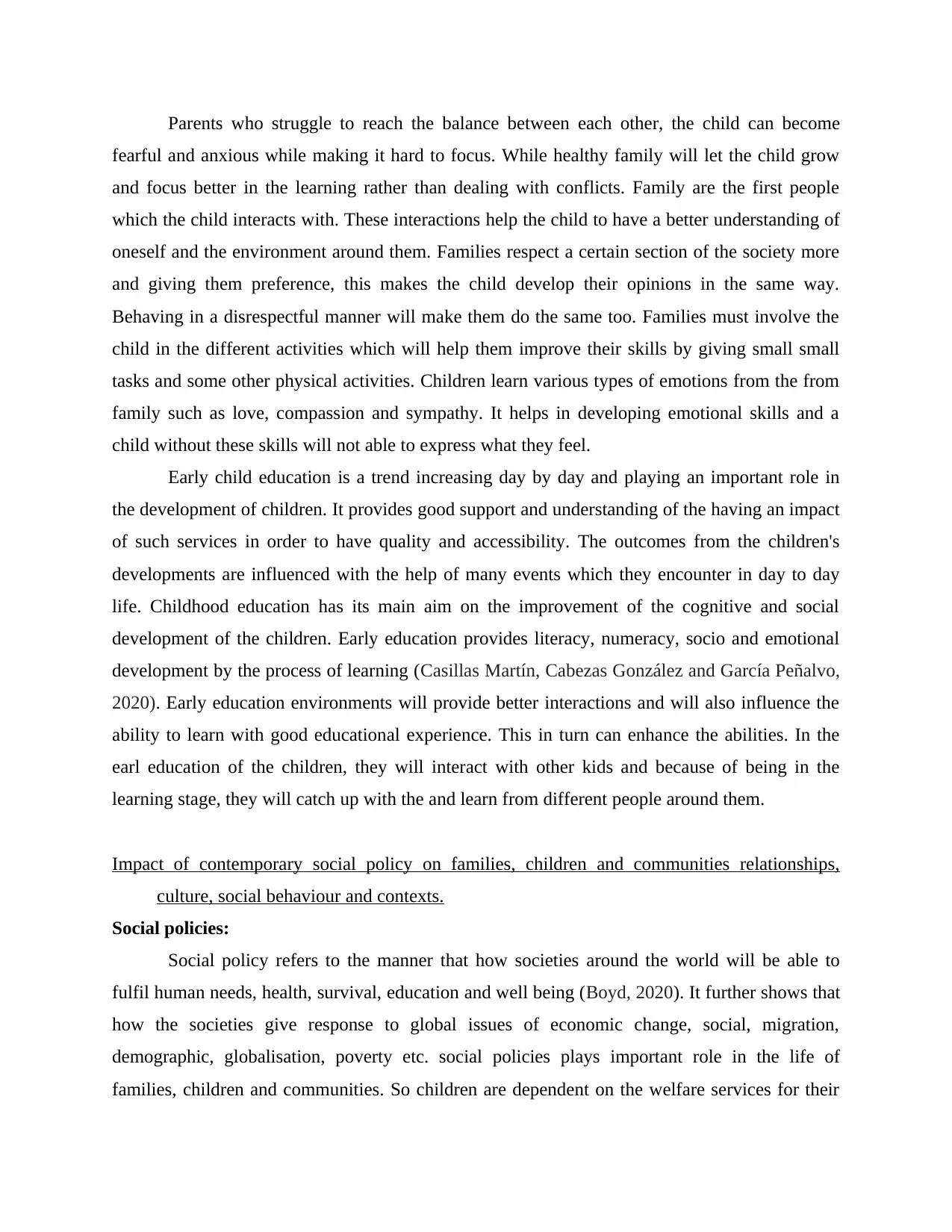
Parents who struggle to reach the balance between each other, the child can become
fearful and anxious while making it hard to focus. While healthy family will let the child grow
and focus better in the learning rather than dealing with conflicts. Family are the first people
which the child interacts with. These interactions help the child to have a better understanding of
oneself and the environment around them. Families respect a certain section of the society more
and giving them preference, this makes the child develop their opinions in the same way.
Behaving in a disrespectful manner will make them do the same too. Families must involve the
child in the different activities which will help them improve their skills by giving small small
tasks and some other physical activities. Children learn various types of emotions from the from
family such as love, compassion and sympathy. It helps in developing emotional skills and a
child without these skills will not able to express what they feel.
Early child education is a trend increasing day by day and playing an important role in
the development of children. It provides good support and understanding of the having an impact
of such services in order to have quality and accessibility. The outcomes from the children's
developments are influenced with the help of many events which they encounter in day to day
life. Childhood education has its main aim on the improvement of the cognitive and social
development of the children. Early education provides literacy, numeracy, socio and emotional
development by the process of learning (Casillas Martín, Cabezas González and García Peñalvo,
2020). Early education environments will provide better interactions and will also influence the
ability to learn with good educational experience. This in turn can enhance the abilities. In the
earl education of the children, they will interact with other kids and because of being in the
learning stage, they will catch up with the and learn from different people around them.
Impact of contemporary social policy on families, children and communities relationships,
culture, social behaviour and contexts.
Social policies:
Social policy refers to the manner that how societies around the world will be able to
fulfil human needs, health, survival, education and well being (Boyd, 2020). It further shows that
how the societies give response to global issues of economic change, social, migration,
demographic, globalisation, poverty etc. social policies plays important role in the life of
families, children and communities. So children are dependent on the welfare services for their
fearful and anxious while making it hard to focus. While healthy family will let the child grow
and focus better in the learning rather than dealing with conflicts. Family are the first people
which the child interacts with. These interactions help the child to have a better understanding of
oneself and the environment around them. Families respect a certain section of the society more
and giving them preference, this makes the child develop their opinions in the same way.
Behaving in a disrespectful manner will make them do the same too. Families must involve the
child in the different activities which will help them improve their skills by giving small small
tasks and some other physical activities. Children learn various types of emotions from the from
family such as love, compassion and sympathy. It helps in developing emotional skills and a
child without these skills will not able to express what they feel.
Early child education is a trend increasing day by day and playing an important role in
the development of children. It provides good support and understanding of the having an impact
of such services in order to have quality and accessibility. The outcomes from the children's
developments are influenced with the help of many events which they encounter in day to day
life. Childhood education has its main aim on the improvement of the cognitive and social
development of the children. Early education provides literacy, numeracy, socio and emotional
development by the process of learning (Casillas Martín, Cabezas González and García Peñalvo,
2020). Early education environments will provide better interactions and will also influence the
ability to learn with good educational experience. This in turn can enhance the abilities. In the
earl education of the children, they will interact with other kids and because of being in the
learning stage, they will catch up with the and learn from different people around them.
Impact of contemporary social policy on families, children and communities relationships,
culture, social behaviour and contexts.
Social policies:
Social policy refers to the manner that how societies around the world will be able to
fulfil human needs, health, survival, education and well being (Boyd, 2020). It further shows that
how the societies give response to global issues of economic change, social, migration,
demographic, globalisation, poverty etc. social policies plays important role in the life of
families, children and communities. So children are dependent on the welfare services for their
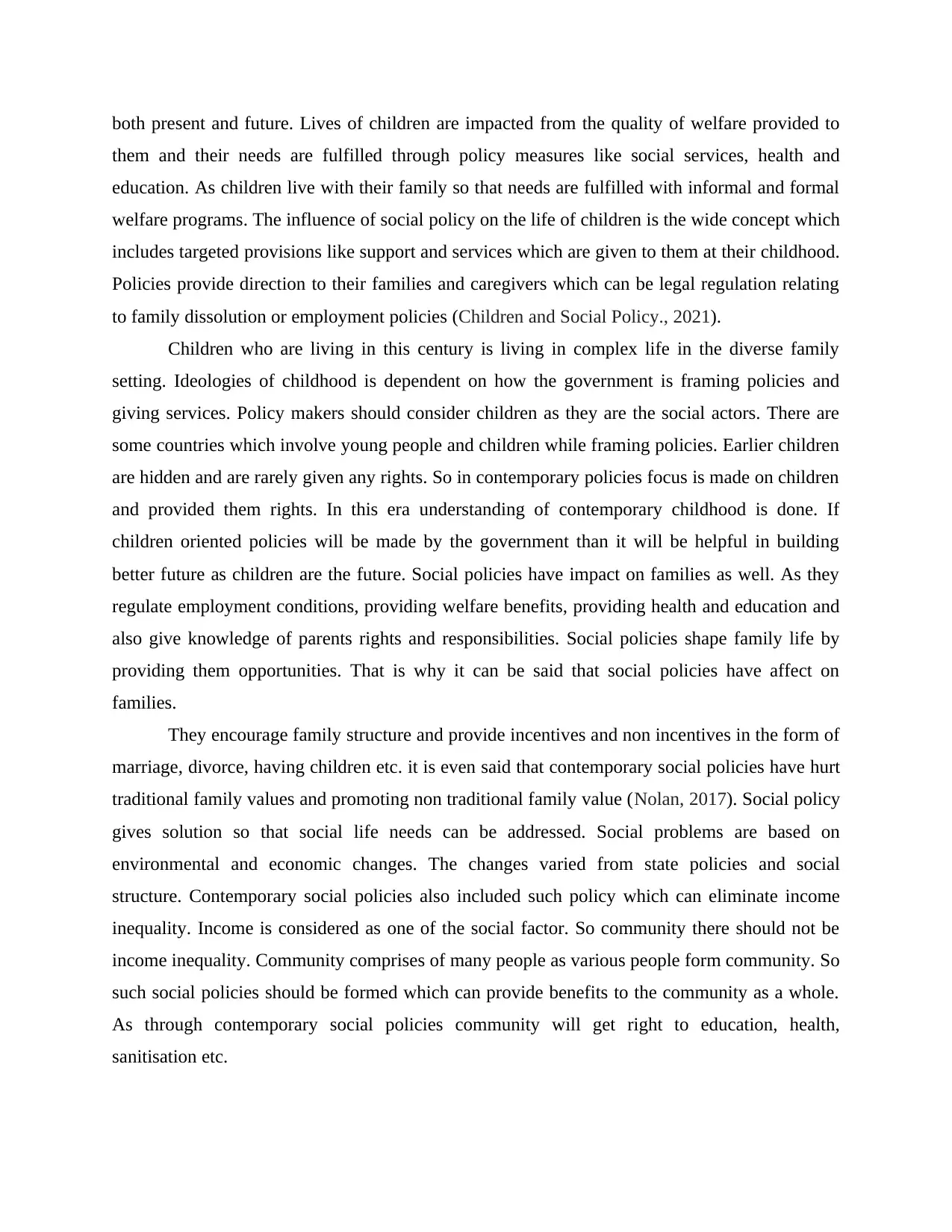
both present and future. Lives of children are impacted from the quality of welfare provided to
them and their needs are fulfilled through policy measures like social services, health and
education. As children live with their family so that needs are fulfilled with informal and formal
welfare programs. The influence of social policy on the life of children is the wide concept which
includes targeted provisions like support and services which are given to them at their childhood.
Policies provide direction to their families and caregivers which can be legal regulation relating
to family dissolution or employment policies (Children and Social Policy., 2021).
Children who are living in this century is living in complex life in the diverse family
setting. Ideologies of childhood is dependent on how the government is framing policies and
giving services. Policy makers should consider children as they are the social actors. There are
some countries which involve young people and children while framing policies. Earlier children
are hidden and are rarely given any rights. So in contemporary policies focus is made on children
and provided them rights. In this era understanding of contemporary childhood is done. If
children oriented policies will be made by the government than it will be helpful in building
better future as children are the future. Social policies have impact on families as well. As they
regulate employment conditions, providing welfare benefits, providing health and education and
also give knowledge of parents rights and responsibilities. Social policies shape family life by
providing them opportunities. That is why it can be said that social policies have affect on
families.
They encourage family structure and provide incentives and non incentives in the form of
marriage, divorce, having children etc. it is even said that contemporary social policies have hurt
traditional family values and promoting non traditional family value (Nolan, 2017). Social policy
gives solution so that social life needs can be addressed. Social problems are based on
environmental and economic changes. The changes varied from state policies and social
structure. Contemporary social policies also included such policy which can eliminate income
inequality. Income is considered as one of the social factor. So community there should not be
income inequality. Community comprises of many people as various people form community. So
such social policies should be formed which can provide benefits to the community as a whole.
As through contemporary social policies community will get right to education, health,
sanitisation etc.
them and their needs are fulfilled through policy measures like social services, health and
education. As children live with their family so that needs are fulfilled with informal and formal
welfare programs. The influence of social policy on the life of children is the wide concept which
includes targeted provisions like support and services which are given to them at their childhood.
Policies provide direction to their families and caregivers which can be legal regulation relating
to family dissolution or employment policies (Children and Social Policy., 2021).
Children who are living in this century is living in complex life in the diverse family
setting. Ideologies of childhood is dependent on how the government is framing policies and
giving services. Policy makers should consider children as they are the social actors. There are
some countries which involve young people and children while framing policies. Earlier children
are hidden and are rarely given any rights. So in contemporary policies focus is made on children
and provided them rights. In this era understanding of contemporary childhood is done. If
children oriented policies will be made by the government than it will be helpful in building
better future as children are the future. Social policies have impact on families as well. As they
regulate employment conditions, providing welfare benefits, providing health and education and
also give knowledge of parents rights and responsibilities. Social policies shape family life by
providing them opportunities. That is why it can be said that social policies have affect on
families.
They encourage family structure and provide incentives and non incentives in the form of
marriage, divorce, having children etc. it is even said that contemporary social policies have hurt
traditional family values and promoting non traditional family value (Nolan, 2017). Social policy
gives solution so that social life needs can be addressed. Social problems are based on
environmental and economic changes. The changes varied from state policies and social
structure. Contemporary social policies also included such policy which can eliminate income
inequality. Income is considered as one of the social factor. So community there should not be
income inequality. Community comprises of many people as various people form community. So
such social policies should be formed which can provide benefits to the community as a whole.
As through contemporary social policies community will get right to education, health,
sanitisation etc.
Paraphrase This Document
Need a fresh take? Get an instant paraphrase of this document with our AI Paraphraser
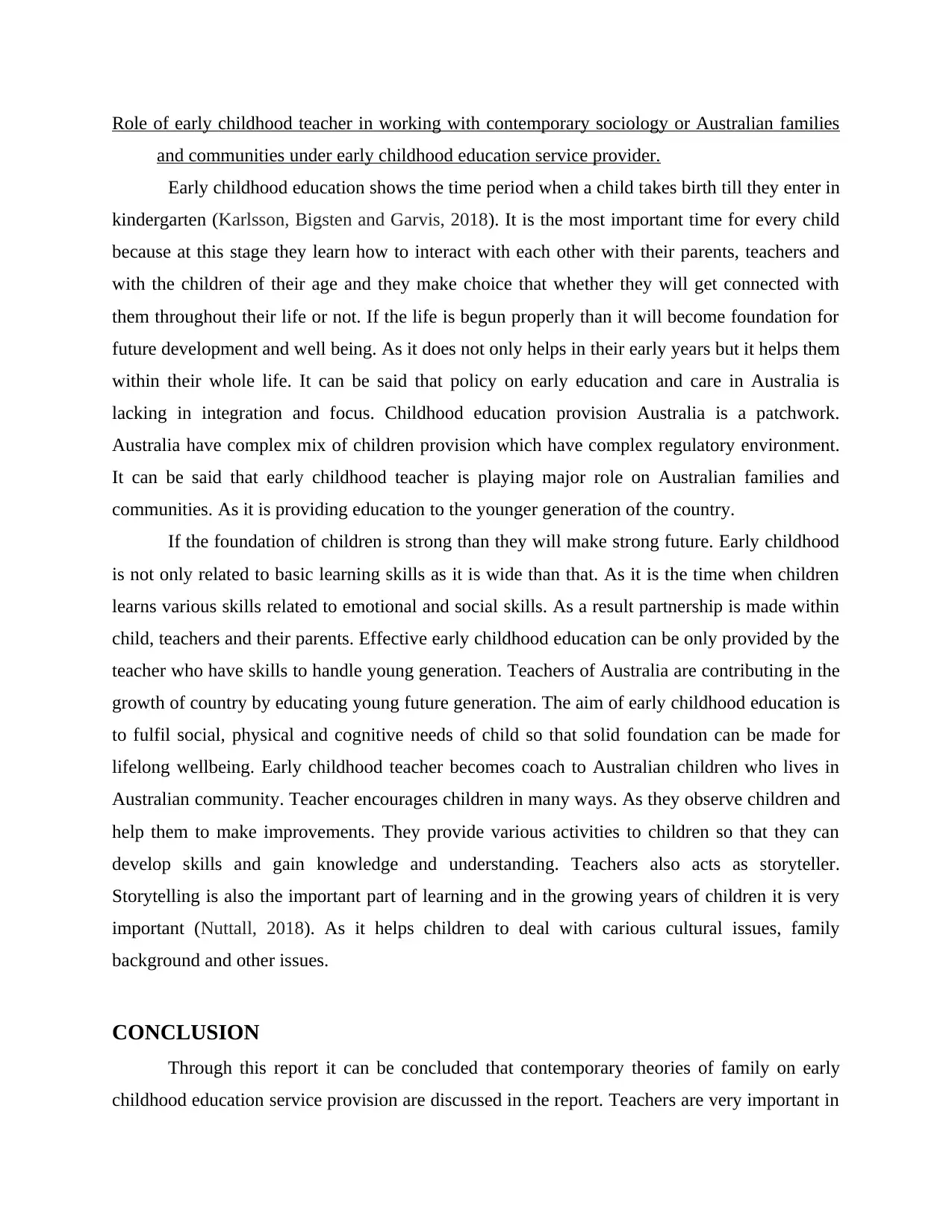
Role of early childhood teacher in working with contemporary sociology or Australian families
and communities under early childhood education service provider.
Early childhood education shows the time period when a child takes birth till they enter in
kindergarten (Karlsson, Bigsten and Garvis, 2018). It is the most important time for every child
because at this stage they learn how to interact with each other with their parents, teachers and
with the children of their age and they make choice that whether they will get connected with
them throughout their life or not. If the life is begun properly than it will become foundation for
future development and well being. As it does not only helps in their early years but it helps them
within their whole life. It can be said that policy on early education and care in Australia is
lacking in integration and focus. Childhood education provision Australia is a patchwork.
Australia have complex mix of children provision which have complex regulatory environment.
It can be said that early childhood teacher is playing major role on Australian families and
communities. As it is providing education to the younger generation of the country.
If the foundation of children is strong than they will make strong future. Early childhood
is not only related to basic learning skills as it is wide than that. As it is the time when children
learns various skills related to emotional and social skills. As a result partnership is made within
child, teachers and their parents. Effective early childhood education can be only provided by the
teacher who have skills to handle young generation. Teachers of Australia are contributing in the
growth of country by educating young future generation. The aim of early childhood education is
to fulfil social, physical and cognitive needs of child so that solid foundation can be made for
lifelong wellbeing. Early childhood teacher becomes coach to Australian children who lives in
Australian community. Teacher encourages children in many ways. As they observe children and
help them to make improvements. They provide various activities to children so that they can
develop skills and gain knowledge and understanding. Teachers also acts as storyteller.
Storytelling is also the important part of learning and in the growing years of children it is very
important (Nuttall, 2018). As it helps children to deal with carious cultural issues, family
background and other issues.
CONCLUSION
Through this report it can be concluded that contemporary theories of family on early
childhood education service provision are discussed in the report. Teachers are very important in
and communities under early childhood education service provider.
Early childhood education shows the time period when a child takes birth till they enter in
kindergarten (Karlsson, Bigsten and Garvis, 2018). It is the most important time for every child
because at this stage they learn how to interact with each other with their parents, teachers and
with the children of their age and they make choice that whether they will get connected with
them throughout their life or not. If the life is begun properly than it will become foundation for
future development and well being. As it does not only helps in their early years but it helps them
within their whole life. It can be said that policy on early education and care in Australia is
lacking in integration and focus. Childhood education provision Australia is a patchwork.
Australia have complex mix of children provision which have complex regulatory environment.
It can be said that early childhood teacher is playing major role on Australian families and
communities. As it is providing education to the younger generation of the country.
If the foundation of children is strong than they will make strong future. Early childhood
is not only related to basic learning skills as it is wide than that. As it is the time when children
learns various skills related to emotional and social skills. As a result partnership is made within
child, teachers and their parents. Effective early childhood education can be only provided by the
teacher who have skills to handle young generation. Teachers of Australia are contributing in the
growth of country by educating young future generation. The aim of early childhood education is
to fulfil social, physical and cognitive needs of child so that solid foundation can be made for
lifelong wellbeing. Early childhood teacher becomes coach to Australian children who lives in
Australian community. Teacher encourages children in many ways. As they observe children and
help them to make improvements. They provide various activities to children so that they can
develop skills and gain knowledge and understanding. Teachers also acts as storyteller.
Storytelling is also the important part of learning and in the growing years of children it is very
important (Nuttall, 2018). As it helps children to deal with carious cultural issues, family
background and other issues.
CONCLUSION
Through this report it can be concluded that contemporary theories of family on early
childhood education service provision are discussed in the report. Teachers are very important in
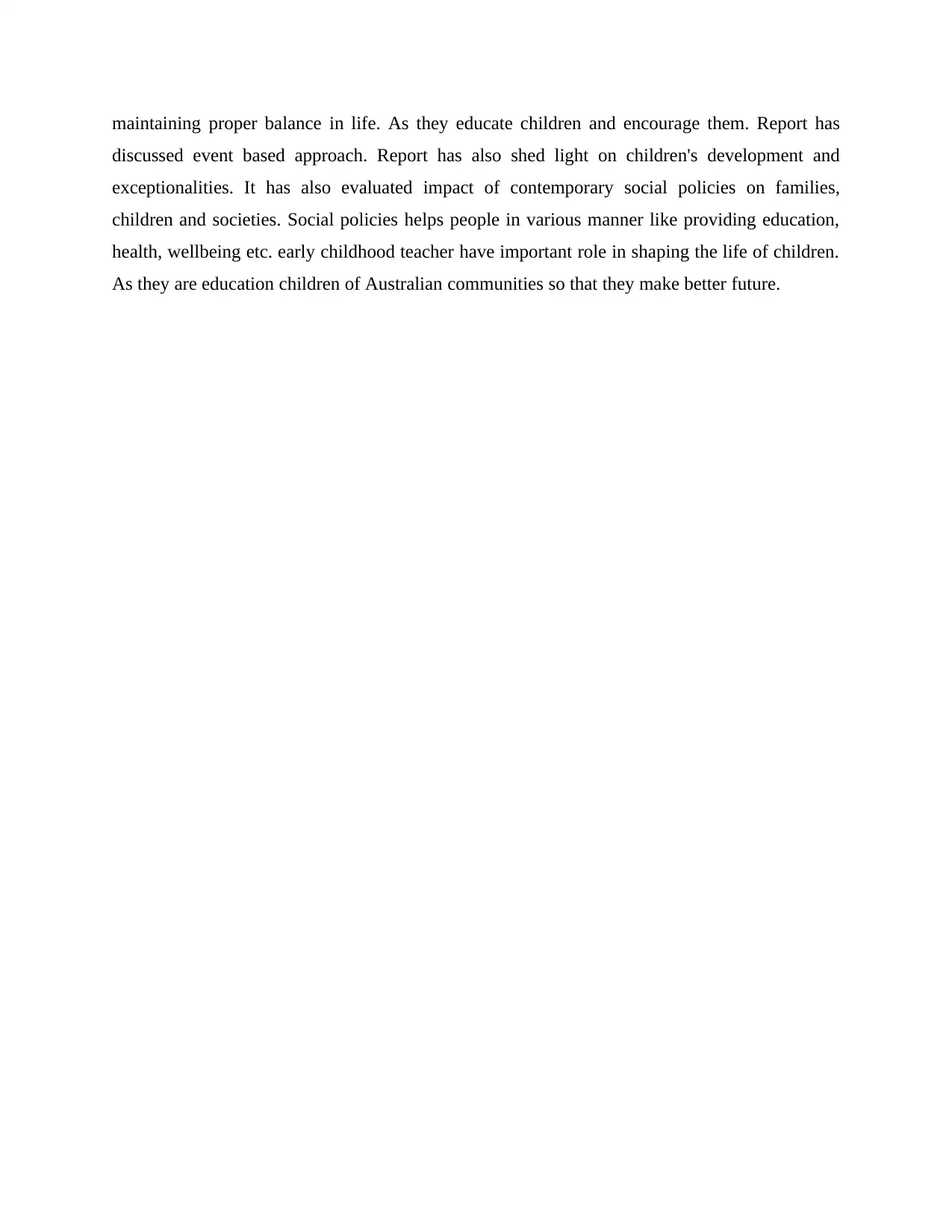
maintaining proper balance in life. As they educate children and encourage them. Report has
discussed event based approach. Report has also shed light on children's development and
exceptionalities. It has also evaluated impact of contemporary social policies on families,
children and societies. Social policies helps people in various manner like providing education,
health, wellbeing etc. early childhood teacher have important role in shaping the life of children.
As they are education children of Australian communities so that they make better future.
discussed event based approach. Report has also shed light on children's development and
exceptionalities. It has also evaluated impact of contemporary social policies on families,
children and societies. Social policies helps people in various manner like providing education,
health, wellbeing etc. early childhood teacher have important role in shaping the life of children.
As they are education children of Australian communities so that they make better future.
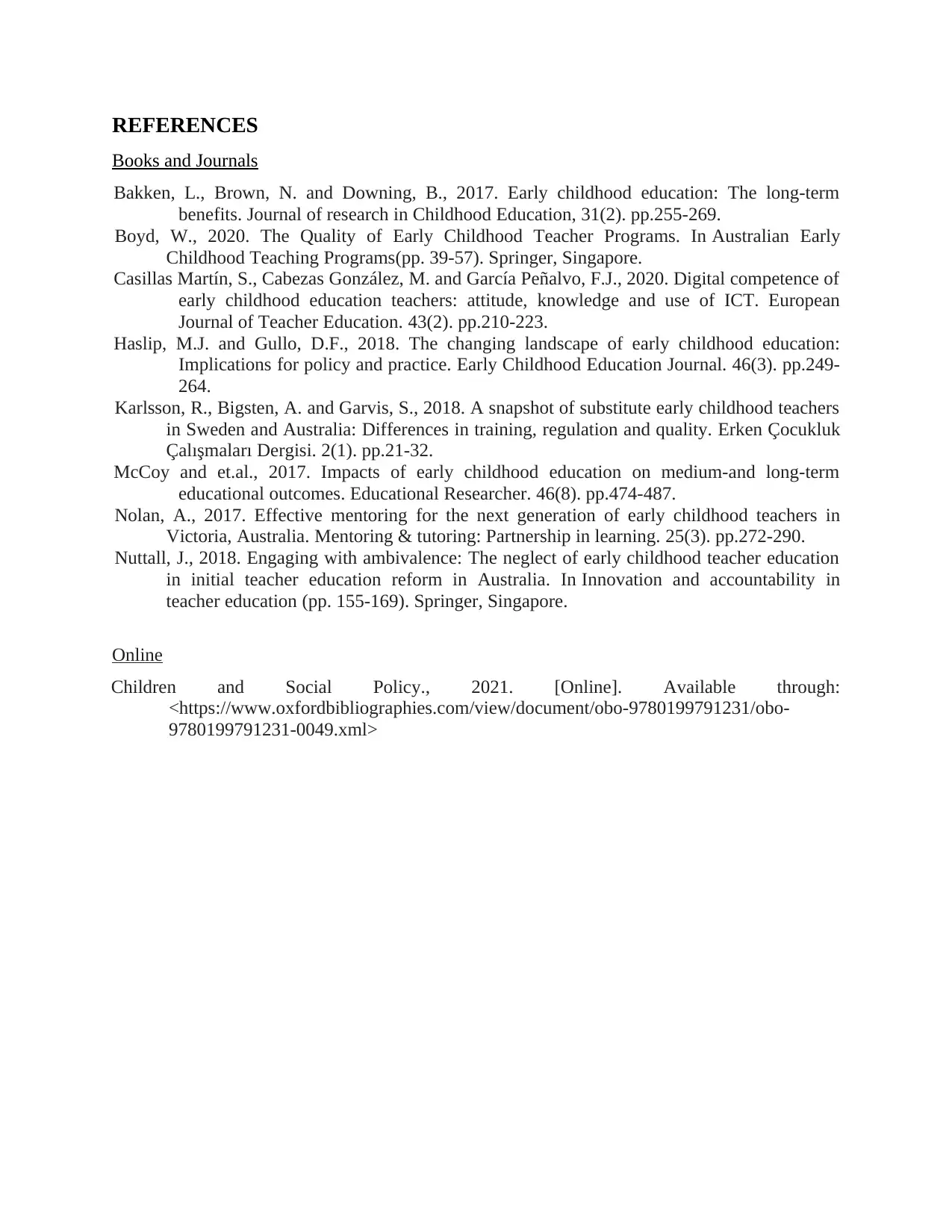
REFERENCES
Books and Journals
Bakken, L., Brown, N. and Downing, B., 2017. Early childhood education: The long-term
benefits. Journal of research in Childhood Education, 31(2). pp.255-269.
Boyd, W., 2020. The Quality of Early Childhood Teacher Programs. In Australian Early
Childhood Teaching Programs(pp. 39-57). Springer, Singapore.
Casillas Martín, S., Cabezas González, M. and García Peñalvo, F.J., 2020. Digital competence of
early childhood education teachers: attitude, knowledge and use of ICT. European
Journal of Teacher Education. 43(2). pp.210-223.
Haslip, M.J. and Gullo, D.F., 2018. The changing landscape of early childhood education:
Implications for policy and practice. Early Childhood Education Journal. 46(3). pp.249-
264.
Karlsson, R., Bigsten, A. and Garvis, S., 2018. A snapshot of substitute early childhood teachers
in Sweden and Australia: Differences in training, regulation and quality. Erken Çocukluk
Çalışmaları Dergisi. 2(1). pp.21-32.
McCoy and et.al., 2017. Impacts of early childhood education on medium-and long-term
educational outcomes. Educational Researcher. 46(8). pp.474-487.
Nolan, A., 2017. Effective mentoring for the next generation of early childhood teachers in
Victoria, Australia. Mentoring & tutoring: Partnership in learning. 25(3). pp.272-290.
Nuttall, J., 2018. Engaging with ambivalence: The neglect of early childhood teacher education
in initial teacher education reform in Australia. In Innovation and accountability in
teacher education (pp. 155-169). Springer, Singapore.
Online
Children and Social Policy., 2021. [Online]. Available through:
<https://www.oxfordbibliographies.com/view/document/obo-9780199791231/obo-
9780199791231-0049.xml>
Books and Journals
Bakken, L., Brown, N. and Downing, B., 2017. Early childhood education: The long-term
benefits. Journal of research in Childhood Education, 31(2). pp.255-269.
Boyd, W., 2020. The Quality of Early Childhood Teacher Programs. In Australian Early
Childhood Teaching Programs(pp. 39-57). Springer, Singapore.
Casillas Martín, S., Cabezas González, M. and García Peñalvo, F.J., 2020. Digital competence of
early childhood education teachers: attitude, knowledge and use of ICT. European
Journal of Teacher Education. 43(2). pp.210-223.
Haslip, M.J. and Gullo, D.F., 2018. The changing landscape of early childhood education:
Implications for policy and practice. Early Childhood Education Journal. 46(3). pp.249-
264.
Karlsson, R., Bigsten, A. and Garvis, S., 2018. A snapshot of substitute early childhood teachers
in Sweden and Australia: Differences in training, regulation and quality. Erken Çocukluk
Çalışmaları Dergisi. 2(1). pp.21-32.
McCoy and et.al., 2017. Impacts of early childhood education on medium-and long-term
educational outcomes. Educational Researcher. 46(8). pp.474-487.
Nolan, A., 2017. Effective mentoring for the next generation of early childhood teachers in
Victoria, Australia. Mentoring & tutoring: Partnership in learning. 25(3). pp.272-290.
Nuttall, J., 2018. Engaging with ambivalence: The neglect of early childhood teacher education
in initial teacher education reform in Australia. In Innovation and accountability in
teacher education (pp. 155-169). Springer, Singapore.
Online
Children and Social Policy., 2021. [Online]. Available through:
<https://www.oxfordbibliographies.com/view/document/obo-9780199791231/obo-
9780199791231-0049.xml>
1 out of 10
Related Documents
Your All-in-One AI-Powered Toolkit for Academic Success.
+13062052269
info@desklib.com
Available 24*7 on WhatsApp / Email
![[object Object]](/_next/static/media/star-bottom.7253800d.svg)
Unlock your academic potential
© 2024 | Zucol Services PVT LTD | All rights reserved.





